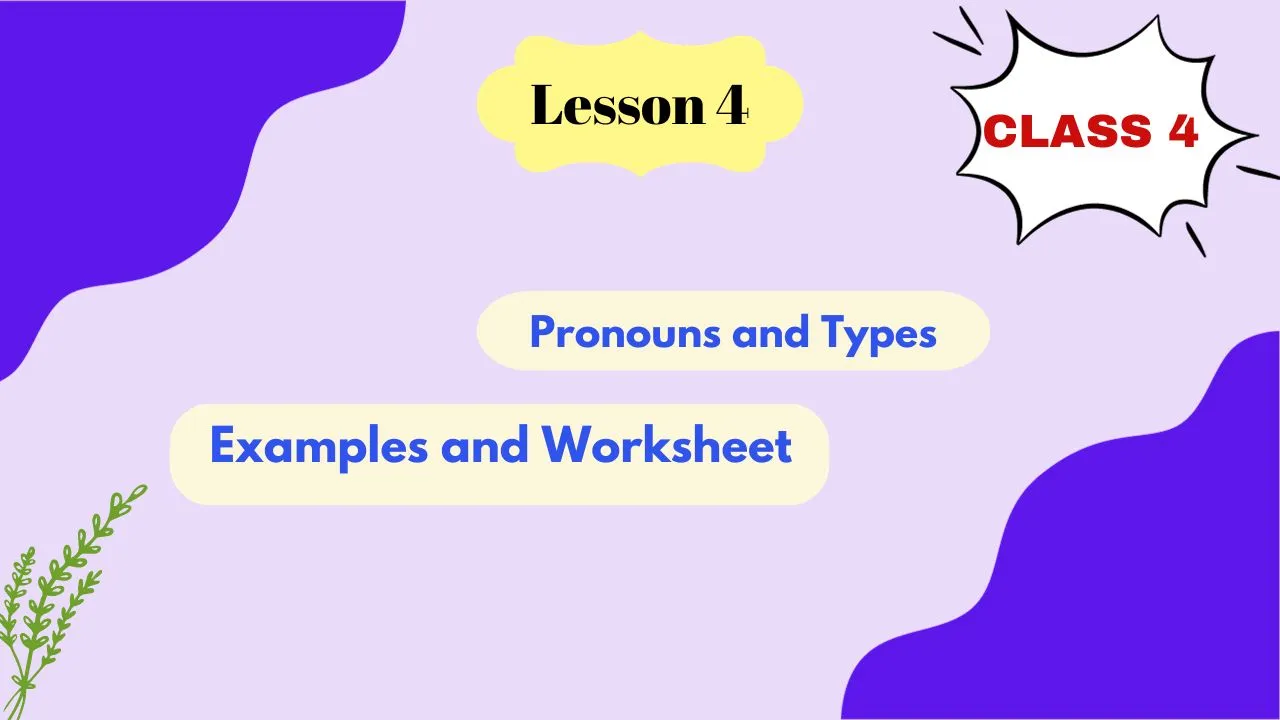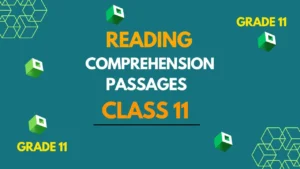Pronouns for Class 4 introduce words replacing nouns. Examples: he, she, they, it. Worksheet tasks include identifying and using pronouns in sentences. Engaging exercises aid in understanding their usage and importance in language, making learning interactive and fun for fourth-grade students.
A pronoun is used in place of a noun.
●My name is Zara. Í am ten years old.
●Ronit likes to play. He likes to play football.
●Shreya plays the violin. She plays the violin very well.
●Let me carry the bag. It looks very heavy.
●Sara likes mangoes. Mother gave her a mango yesterday.
●Varun and I often play together. We play in the park.
We use a pronoun so that we do not have to keep repeating the noun.
Personal pronouns for Class 4
All Lessons Class 4:
| Lesson 1: Noun | Lesson 11: The Present Continuous Tense |
| Lesson 2: Countable and Uncountable Nouns | Lesson 12: The Prast Tense |
| Lesson 3: Gender | Lesson 13: The Future Tense |
| Lesson 4: Pronouns | Lesson 14: Adverbs |
| Lesson 5: Articles | Lesson 15: Prepositions |
| Lesson 6: Adjectives | Lesson 16: Conjunctions |
| Lesson 7: Possessive Adjectives | Lesson 17: Subject Verb Agreement |
| Lesson 8: Order of Adjectives | Lesson 18: Subject and Predicate |
| Lesson 9: Degrees of Adjectives | Lesson 19: Do as Directed |
| Lesson 10: The Present Tense | Lesson 20: Punctuation Marks |
I, he, she, it, they, we, and you are all pronouns. Me, her, him, them, and us are also pronouns. They are all personal pronouns.
1. Personal pronouns refer to people or things already mentioned.
2. They show
a. the first person (the speaker),
b. the second person (the person being spoken to), or
c. the third person (the person being spoken about).
3. If the personal pronoun is the subject of the sentence, we say it is a subject pronoun. If the personal pronoun is the object of the sentence, we say it is an object pronoun. Subject pronouns go before the verb. Object pronouns go after the verb.
●You are late. (subject pronoun)
● I can see you. (object pronoun)
4. Pronouns can be singular or plural.
Here is a table of personal pronouns with examples.
| Person | Subjective Case | Objective Case | Possessive Case |
| First Person | I (singular) we (Plural) | me(singular) us(Plural) | my(singular) our(Plural) |
| Second Person | You(singular) You(Plural) | you(singular) you(Plural) | your(singular) your(Plural) |
| Third Person | he (singular) she (singular) It(singular) they (Plural) | him(singular) her(singular) It(singular) them(Plural) | his(singular) her(singular) Its(singular) their(Plural) |
Possessive pronouns for Class 4
Possessive pronouns show possession or that something belongs to someone.
●This bag belongs to me. It is mine.
●This book belongs to Lata. It is hers.,
●It is our house. It is ours.
●These are your pencils. They are yours.
●It is their cat. It is theirs,
Note: Possessive pronouns are never placed before nouns.
Here is a table with subject pronouns and the corresponding possessive pronouns
| Subject Pronouns | Possessive Pronouns |
| I | mine |
| you | yours |
| he | his |
| she | hers |
| it | its |
| we | ours |
| you | yours |
| they | theirs |
Demonstrative pronouns for Class 4
This, that, these, and those are demonstrative pronouns.
We use this (singular) and these (plural) for people and things near the speaker.
●This is my pen.
●These are my pens.
We use that (singular) and those (plural) for people and things that are far away.
●That is my notebook.
●Those are my notebooks.
Note
When this, that, these, and those are used before a noun, then they are adjectives. When this, that, these, and those are not followed by a noun, they act as pronouns.
Read the examples given in the table below.
| Adjectives | Demonstrative Pronoun |
| This book is new. | This is my book. |
| These books are new. | These are new books. |
| That clock is old. | That is an old clock |
| Those flowers are lovely. | Those are lovely flowers. |
Pronouns for Class 4 Worksheet 1
A. Circle the subject pronouns and underline the object pronouns in the following sentences.
1. (We)must tell her.
2. Tam buying tickets for them.
3. Have you seen him today?
4. She wants to borrow it.
5. Didn’t they inform you?
6. It is disturbing us.
Pronouns for Class 4 Worksheet 2
B. Rewrite the following sentences using personal pronouns in place of the highlighted nouns.
1. Tara is playing with her friends.
…………………………………………….
2. You must apologize to Deepak.
…………………………………………….
3. I told John the truth.
…………………………………………….
4. Reena and Vinay are riding bicycles.
…………………………………………….
5. The table is quite strong.
…………………………………………….
6. Are you going to invite Madhu and Arya?
…………………………………………….
Pronouns for Class 4 Worksheet 3
C. Choose the correct possessive pronouns to complete these sentences.
1. Rekha bought this bag. It is …………….
a. his
b. Yours
c. hers
2. The vase was gifted to us. It is …………….
a. ours
b. hers
c. yours
3. I wrote this poem. It is …………….
a. yours
b. Mine
c. his
4. This is a gift for you. It is …………….
a. yours
b. theirs
c. his
5. Samira and Saina won this prize. It is …………….
a. theirs
b. Yours
c. ours
6. Anand made this painting. It is …………….
a. Theirs
b. his
c. mine
Pronouns for Class 4 Worksheet 4
D. Complete these sentences with the correct possessive pronouns.
1. His calculator is working, but …………… isn’t. I have to buy a new one.
2. I have had my breakfast, but Sandhya is yet to have …………….
3. We gave them our telephone number and they gave us ……………
4. Did you lose your red scarf? Is this scarf ……………?
5. Arun is drawing with some crayons. But, they are not………….. He borrowed them from Nisha.
6. This is not our package. We will receive…………… tomorrow.
Pronouns for Class 4 Worksheet 5
E. Choose the correct demonstrative pronouns to complete these sentences.
1. ……………… (This/These) are my cousins, Tanvi and Nisha. They are here on vacation.
2. ……………… (That/This) is my cricket coach over there!
3. ……………… (Those/These) are my grandparents, sitting on the sofa.
4. ……………… (that/this) is Anish. May I speak to Varun?
5. ……………… (This/These) are the musicians I wanted you to meet.
6. ……………… (That/Those) sounds like Pranav.
Worksheet 6
F. Underline the pronouns in these sentences. Then, write P for personal pronouns, PO for possessive pronouns, and D for demonstrative pronouns.
1. Akila said it was yours. ………………………..
2. I forgot to pack my sweater. ………………………..
3. Sheila stayed with them. ………………………..
4. That must be John. ………………………..
5. They bought a new car. ………………………..
6. Those are student volunteers. ………………………..
7. The rains had cleaned his car and mine. ………………………..
8. Sunaina gave it away. ………………………..
Worksheet 7
G. Complete the following story using suitable pronouns.
Afreen is ready for school, but she is looking for something. …………. can’t seem to find her English notebook. ………… goes to the hall and asks her parents. …………. haven’t seen it either.” ………….will help …………. look for …………. they say. …………. search the cupboards, under the sofa, behind the television. “Is this notebook ………….?” Mother asks, picking one up off the chair. “Yes, it is ………….. But …………. is my journal,” says Afreen.
The search party moves from one room to the other, looking for the missing notebook. Suddenly, Father asks, “Did ………… check your bag, Afreen?” Afreen replies, “No, Dad. …………. am looking for my notebook, so that I can put …….. in my bag.” Father and Mother exchange looks, then reach for her bag, and there …………. is. The English notebook! Afreen smiles sheepishly at ………….. Father and Mother start laughing.
Worksheet 8
H. Pick any chapter of your choice from the English coursebook. Underline all the pronouns you can find. Can you tell their type too? Note them down here. Personal pronouns
Frequently Asked Questions
Ans: Pronouns are words that can replace nouns in a sentence. Here are some examples of pronouns suitable for Class 4 students:
Personal Pronouns:
Singular: I, you, he, she, it
Plural: we, you, they
Demonstrative Pronouns:
this, that, these, those
Possessive Pronouns:
mine, yours, his, hers, its, ours, theirs
Reflexive Pronouns:
myself, yourself, himself, herself, itself, ourselves, yourselves, themselves
Interrogative Pronouns:
who, whom, whose, which, what
Indefinite Pronouns:
all, another, any, anybody, anyone, anything, each, either, everybody, everyone, everything, few, many, nobody, none, one, several, some, somebody, someone, something
These pronouns can be taught through exercises, sentences, and examples to help students understand their usage in sentences.
Ans: Teaching pronouns to fourth graders involves interactive activities like sentence building, games, and stories. Use visuals and exercises to illustrate how pronouns replace nouns, and engage students in practice sessions to reinforce understanding and usage in sentences.
Ans: For Grade 4 CBSE, pronouns include personal pronouns (I, you, he, she, it, we, they), demonstrative pronouns (this, that, these, those), possessive pronouns (mine, yours, his, hers, its, ours, theirs), interrogative pronouns (who, whom, whose, which, what), and indefinite pronouns (everyone, somebody, anyone, etc.).
Ans: A pronoun is a word used in place of a noun to avoid repetition in sentences. Here are 10 examples of pronouns:
Personal Pronouns: I, you, he, she, it, we, they
Possessive Pronouns: mine, yours, his, hers, its, ours, theirs
Demonstrative Pronouns: this, that, these, those
Reflexive Pronouns: myself, yourself, himself, herself, itself, ourselves, yourselves, themselves
Interrogative Pronouns: who, whom, whose, which, what
Indefinite Pronouns: everyone, somebody, anybody, nobody, each, few, many, some, several, all
Ans: Here are the five types of pronouns with examples:
Personal Pronouns: Used to refer to specific persons or things. Example: She went to the store.
Possessive Pronouns: Indicate ownership or possession. Example: That book is mine.
Demonstrative Pronouns: Point out specific persons, places, or things. Example: These are the shoes I want to buy.
Relative Pronouns: Connect a clause or phrase to a noun or pronoun. Example: The man who is wearing a hat is my uncle.
Interrogative Pronouns: Used to ask questions. Example: Whose bag is this?







